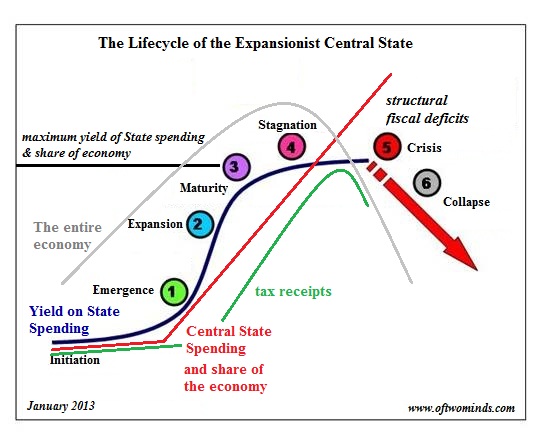Ark. Gov. Mike Beebe
OK, so that may actually be "The Sun King" Louis the XIV. But the two actually seem to have a very similar governing philosophy. Neither seems to think much of getting any real input from a legislature, even on the largest questions. So which of the two uttered the famous quote "I am the state"? Ahh, it could have been either I guess.
No question looms larger at the moment for state government than whether or not to expand Medicaid to cover adults who make up to 130% of the poverty level in income. The move is a major component of Obamacare.
Some Republicans have suggested that the question is so important that rather than have it dominate the session, perhaps it should be dealt with in a separate, special session dedicated to that purpose.
His majesty, er, the Governor, has expressed displeasure at the idea, unless it is a three-day pro-forma affair, with the results worked out beforehand in a series of back room deals.
Peasants of the Realm, let's have no more talk of open debate, the only light you need shed on this question comes from the Radiance of your Divine Sun King himself!
The idea that mere legislators should have serious input on important legislation seems to produce discomfort. After all, the legislature is "the people's branch." Why, those legislators are so close to the ground that they often hear from citizens in Nowhere County without even a lobbyist being present! No wonder they sometimes come to session with seditious ideas!
Those on the left, perpetual adolescents that most of them are, hear that the Federal government is offering "free money" if only Arkansas will agree to expand the welfare state again. To them, its a no brainer. Free money, you take it. Free sex, you take it. Free drugs, you take it. Adults of course, understand that there is no "free." There is always a cost, and there are always risks. What does not always exist, particularly among the perpetual adolescents, is a realistic consideration of what the costs and the risks are before they jump. The stage we are now in politically will be familiar to many parents. It is the stage when the adolescents are frustrated, impatient, and outraged when grown-ups stop to consider all the consequences instead of just "going for it."
They have been enabled by a RAND study which showed that when a state increased its Medicaid coverage the death rate for those under 65 decreased by 6.1%. If the same applied here this would equate to, so I am told, from 1,000 to 2,300 Arkansans having their lives extended. With the adolescent propensity to leap on any fact available to radiate indignation and a shallow sense of moral superiority against whoever is between them and their having their own way, this is enough evidence to conclude that a vote against expanding Medicaid is a vote to kill poor people.
It is not that simple of course, although saying that often produces angry objections from the left. To them it is that simple. If there is a problem, throw other people's money at it in the form of government largesse until it goes away. They have no patience for more nuanced and complicated answers, even if their own answers are utter failures which cannot be sustained.
For example, an adult considering whether or not to take on such an obligation might ask whether the fiscal condition of the entity offering to pay for the expansion is healthy enough that we can be sure they will not renege on their commitments. In the case of FEDGOV, the obvious answer is "no." The perpetual adolescents are screaming at legislators to "take the free money" oblivious to the fact that the person promising the money doesn't have it.
Washington D.C. is isolated from reality and suffers from a bad case of "normalcy bias". They think things will be the same as they've been for years because that's the way things have been for years. It's somewhere between circular reasoning and delusion. It is also a frequent mistake made by persons without a lot of experience or perspective (i.e. adolescents). FEDGOV presses on with lavish promises and massive expansions just like they still have money. They don't, and foreigners will decide when our last national credit card has been maxed out.
Many of our wiser state legislators are wondering if they should launch major new commitments based on the promise of funding from the most indebted institution in all of human history. Suppose you knew a man who used to be rich, but was now living off of credit in a state of denial about his present financial position. If he offered to fund a joint venture with you, would you re-arrange your life so as to take the offer?
You see the RAND study did not even address the issue of whether or not future funding was likely. Nor did it consider what might happen to existing patients on Medicaid if the system breaks from expanding it beyond realistic available resources. Many have viewed public welfare programs as a "safety net." Using this analogy, the strength of the net is related to the ability of taxpayers to fund it and the number of welfare recipients is the load on the net. What happens to those currently in the net if the net breaks due to more people piling onto it? What happens to those newly dependent on the system only to have it break down?
What I am saying is that the reality is not nearly as simple as "expand the system or you are voting to kill people." That sort of thinking is for perpetual adolescents. Rational adults must factor in the probability that the imagined funding for the expansion will actually materialize and be sustained. Additionally, they will consider the risk to those currently served should the funding, and thus the system it supports, suffer catastrophic collapse due to arrogant miscalculations about the real vs. imagined capabilities of our would-be saviors from D.C. Teenagers think they can handle anything. Accident insurance tables tell a different story.
The truth may be just the opposite of the conclusion implied by the RAND study. Rather than providing longer life to more people, an unsustainable attempt at expansion might cost more years from more lives than doing nothing. Leftists may be literally betting the lives of those currently on Medicaid that Obama knows what he's doing. If one's confidence in the Resident does not rise to that level, then caution is advised.
All this presumes, or at least does not challenge the idea, that the government ought to be in the business of providing health care to citizens paid for by taxes forcibly collected from other citizens. That's not my philosophical position, but its where most people are now and given where we are now I think its what we have to do, so I analyzed the policy from that viewpoint. But real adults could consider even deeper questions. For example, would it be "moral" to make all citizens of Arkansas permanent slaves in order to lengthen the life of one person for ten years? If it would not, then what about lengthening the lives of two people for ten years? Still not a good deal?
Perhaps the answer should be that it is immoral to make slaves of someone, even to add years to one's life, and the number slaved vs. the years saved does not morally matter. Yet this is the slippery slope we find ourselves descending because we have been able for a half a century to grow the welfare state on credit. In the recent past we could say "yes" on credit and help people at once while deferring till later the thorny question of who was going to have to spend years of their life slaving away to pay the bill. We are running out of credit, and further purchases of welfare will soon have to be paid for on a cash basis.
And I am not saying that we have to accept current under-65 death rates either. I am only saying that we have to find other, more subtle, ways of lowering such rates. Such ways are often beyond the power of the blunt instrument of government to deliver. Primary among them would be an increase in personal morality and responsibility. An increase in private charity could reduce such death rates, but implementation of this outcome is hampered in part by a wide-spread belief that only government solutions are real solutions. Any solution more subtle than smothering the problem in a dump-truck load full of taxpayer dollars is scoffed at by perpetual adolescents.
The battle will be fierce, I hope the grown-ups stand their ground.






